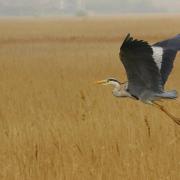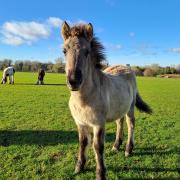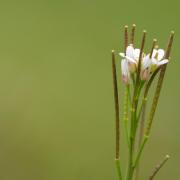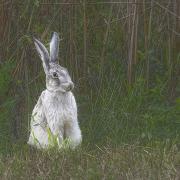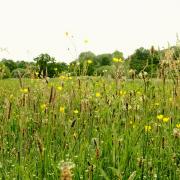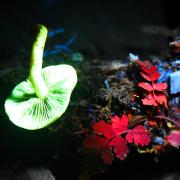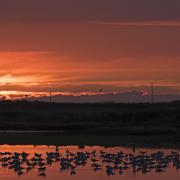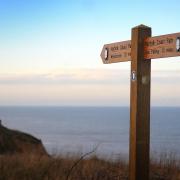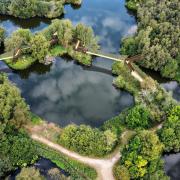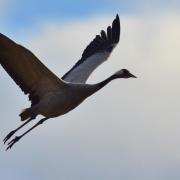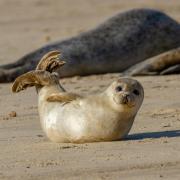As the BBC announces the return of its flagship wildlife programme to Norfolk, Sarah Cassells talks to Pensthorpe owners Bill and Deb Jordan about the life-changing decisions that brought them to the region.
A natural decision
Springwatch is back! As the BBC announces the return of its flagship wildlife programme to Norfolk, Sarah Cassells talks to Pensthorpe owners Bill and Deb Jordan about the life-changing decisions that brought them to the region.
Pictures: Ian Burt
When Springwatch returns to Pensthorpe nature reserve next month, Kate Humble and the production team will be filming around the clock to uncover the secret stories of the region’s fascinating wildlife. But what they won’t tell you is the story of the people behind the reserve, and that’s a pretty wild tale too.
In its 20 year history, Pensthorpe has become one of Norfolk’s best-loved natural treasures and in recent years, it owes so much of its popularity to the hard work and vision of owners Bill and Deb Jordan. Their journey from high-flying professionals to conservation champions is the stuff of rollercoaster rides, taking in unexpected twists and turns from catsuits and cereals, to fashion and TV filming.
Drive through the entrance to Pensthorpe and the vast, diverse reserve is an extraordinary discovery. Meeting the Jordans is a similarly surprising experience. They might be successful entrepreneurs, but they’re also walking adverts for the benefits a wholegrain diet and life outdoors can bring. Both are slim, fit and despite their demanding workloads, exude laidback calm, peppered with enthusiastic outbursts when talking about an exciting reserve project.
So just how did Bill Jordan, the founder of Jordans cereals, and his wife Deb, a former photographer with a background in fashion, become the owners of a nature reserve? It seems the answer begins in their idyllic rural childhoods.
Bill’s was spent on the family’s watermill in Bedfordshire, while Deb, who was born on a farm in Ringstead, grew up cycling the downs, riding combine harvesters and pulling wild oats. “It was wonderfully hands-on and such a free time, which sadly children these days seem to have lost,” she says. Encouraging children to get back in touch with nature in a fun, explorative way is part of the reason the Jordans took the risk of moving the family from Bedfordshire to Pensthorpe in 2002. They wanted their children Jed, now 17, and Inca, 15 – and the children of Norfolk – to experience the kind of upbringing they’d enjoyed.
It was quite a dramatic departure; until that point the pair had forged separately successful careers and Norfolk was simply a regular holiday destination. Deb had worked in London for fashion house Louis F�raud, but from styling photographic shoots had discovered a talent for getting people to relax in front of the camera and become a children’s photographer. She had been introduced to Bill by her sister at a Hot Gossip party in the 1980s. Their meeting involved an all-in-one red catsuit, sported by Bill.
“As soon as she saw me with a fake chest…” recalls Bill. It clearly made the right impression because they married in 1986.
Bill’s career is well documented. Along with his brother David he introduced Britain to a groundbreaking type of breakfast food: the wholegrain cereal. Working at his family’s mill in Biggleswade, Bill had come to the conclusion that the animal feed and flour they produced “wasn’t really going anywhere”. In the late 1960s he travelled in California and came across the idea of using wholegrain in cereals. On his return he began creating Jordans first organic breakfast cereal in his mum’s kitchen.
In 1972 they launched ‘Crunchy G’, which was delivered to small health food stores. In an era when processed convenience foods were part of the nation’s staple diet, Jordan’s health foods were revolutionary and within three years were picked up by the major supermarkets.
“It was early days for concerns about refined food: too much fat and sugar and not enough fibre in our diets and that’s why we did reasonably well, because we managed to tick those boxes,” says Bill. Jordans now sells just shy of one million boxes every week. Bill is still actively involved in the company, although he says less so since its recent merger with Ryvita and his acquisition of a nature reserve.
And so to Pensthorpe. In the summer of 1998, while visiting family in Norfolk, Deb noticed that Bill kept suddenly diverting off to look at old mills and farm buildings.
“I believed he was looking for somewhere that had some involvement with food and farming,” she says. “But then we saw Pensthorpe was up for sale and I could see an interest in Bill. I was slightly nervous about why he wanted to go look at this 500 acre nature reserve because we were very settled in Bedfordshire. But he very cunningly managed to get us there as a family and it was just such an inspirational place.”
They visited on a bright, sunny day and Deb remembers feeling “a huge spiritual connection with nature”. Bill’s impressions were slightly less ethereal. “It just felt good. It was an extraordinary, beautiful part of the countryside that was incredibly unspoilt.”
Taking on a nature reserve might initially have seemed a radical change in direction for the head of a cereal empire, but Bill also saw Pensthorpe as an opportunity to put the company’s commitment to Conservation Grade Farming into action. The farmers who grow grains for Jordans are all paid a premium to create nature-friendly habitats on 10pc of their farmed land to encourage more bees, birds, butterflies and other species to flourish.
“There was an interest in doing that ourselves to see if what we were asking farmers to do actually worked and how hard it was to do,” he says.
With idealistic intentions the Jordans braced themselves for a realistic learning curve. “The first year was very tough,” says Deb. “We signed at Christmas in 2002 and we literally put the children in the car and started running a nature reserve. Looking back, it was a very stressful time because we were out of our comfort zone, but we’ve learned a huge amount with help from other people.”
Originally Deb’s role was going to be overseeing the shop and expansion of the caf�, with a view to setting up an alternative medicine centre in five derelict cottages on site. She dreamed of recreating “Pensthorpe the Village” – a nod to its inclusion in the Domesday Book when it was listed as being bigger than Fakenham. But seven years on the cottage building is still untouched, although it proved useful as the studio for Springwatch.
“I do believe we will get there,” says Deb wistfully. “It was just that our priority completely became the nature reserve.”
She remembers one night when Inca was 11, wrapping her daughter in a blanket and popping her in the back of a car as there was a flamingo that needed to be propped up every two hours. “Someone said to me: but Deb, it wasn’t going to make it. But it’s really difficult to give up on something – you have to try.”
That determined approach and the reserve’s “super” group of staff have seen Pensthorpe go from strength to strength. Open 363 days each year, it recently won the Berry Savory Best Norfolk Attraction (over 60,000 visitors). And it’s fulfilling the Jordans’ initial aim of bringing children and nature together. “What inspired me that very first day was that wherever the children went there were hides, water birds, garden birds and wildlife,” says Deb. “They had this amazing, exhausting experience getting really close to the birds they wouldn’t see at home and learned quite a lot. That’s so important to us and we’ve tried to carry it on.”
Through their work at the reserve, the couple have highlighted the plight of the red squirrel, breeding the appealing creatures in captivity for release on coastal islands, and raised the profile of the tragic corncrake, whose numbers were declining catastrophically in Norfolk. Working with the Zoological Society of London, they help breed them on the reserve before releasing them near Peterborough.
They are also delighted with the impact the “Springwatch effect” has had on their efforts to promote conservation to the nation. “The show is so apt to what we’re trying to do,” says Deb. “It’s so intriguing listening to the presenters talking about what you can do in a window box or a small garden to improve the habitats of insects or garden birds.”
Bill believes the BBC’s decision to film the popular nature show at Pensthorpe is all credit to his wife’s charm. “Bill Oddie came here to visit and look at our corncrakes and everyone was a bit awed by him,” he says. “But Deb wanted to find out what he thought about the conservation work we were doing…”
“Bill was so thrilled with our work, so I asked if we could get a quote and a picture of him to promote the reserve,” remembers Deb. “He said: ‘I love the place you can say what you like!’.”
The following spring, Deb opened an email from the BBC that said Bill had put Pensthorpe on a shortlist of potential locations to film Springwatch. She printed it off and kept it under her pillow for luck. The production team made several visits later in the year and in February 2008 they received confirmation. “And the bedsheets could be changed!” says Bill. “We were so thrilled. They do an amazing job of telling wildlife stories.”
For the past two years the reserve has hosted a 120-strong production team and 50 secret cameras. Presenters Kate Humble, Simon King, Martin Hughes Games and Chris Packham, who replaced Bill Oddie from the second year of filming, have become part of the Pensthorpe extended family. Each year they introduce viewers to the country’s wild birds, small mammals and rare critters and the Jordans are excited about having them return for a third season.
The show has had a huge impact on visitor numbers too. In the Jordan’s first year at Pensthorpe around 35,000 visitors passed through the gates. Last year numbers soared to 90,000. Not ones to rest on their laurels, there are several projects in progress or nearing completion (see panel on page 27), but after seven hectic years the Jordans are tentatively taking steps back and giving more responsibility to their hugely capable team.
However, when it comes to unwinding, their working environment is also the place they go to play. For Bill, the Wildflower Meadow is a perfect antidote to a busy week. “It’s totally unspoilt and at different times of the year it’s crammed with wildlife insects, beautiful orchids and strange old herbs,” he says. Deb, meanwhile, is partial to the view from Pensthorpe’s farm that overlooks the Wader Scrape.
The family also goes for regular runs together around the reserve. Both Inca and Jed compete in local cross-country races and Bill, who completed the North Norfolk Triathlon last year, is in training again and can often be caught cycling up the coast or along Peddars Way.
Long term, Deb hopes to return to portrait photography, but doesn’t anticipate hanging up their wellies anytime soon. “Pensthorpe’s not the biggest thing in the world, but it requires a lot of knowledge about aviculture, farming and conservation and you’re always looking at areas to improve,” says Bill. “Now we have such a strong, committed team the responsibility is getting shared, but it’s an ever-evolving project: you just can’t work in a place like this without being totally passionate about it.”
Springwatch will be on BBC2 from May 31.
New plans and plantings
There have been several changes at Pensthorpe in recent months and even more reason to plan a visit:
A major redesign and replanting project is afoot in the reserve’s Millennium Garden by the original creator and world-renown plantsman Piet Oudolf. Two thirds of the one-acre garden has been divided and replanted and the remaining third has been transformed with 4,000 new plants. The Chelsea Flower Show winner will open the new-look garden this September.
Look out for new additions to the red squirrel enclosure. Part of a national breeding programme, which aims to boost the number of these endangered creatures, Pensthorpe created a purpose-built enclosure last year which produced two litters. It’s believed there’s already a new batch of kittens in the dens that will surface later this year.
The Wader Scrape is one of the reserve’s ‘must dos’ and features a brand new hide with wheelchair access and increased capacity. The area found fame thanks to Springwatch characters such as oyster catchers Emi and Oscar.
Visitors can also see the elegant white-naped Eurasian cranes in their splendid new home, which marks the final stage and completion of the Great Eurasian Forest Exhibit.
Learn as much as possible about nature with new full-time resident wildlife expert Thomas Spencer. Thomas will be sharing his knowledge of birds, mammals and insects through lots of walks and talks this year. The reserve’s Wildflower Meadow is one of the largest in Norfolk and now features a new boardwalk that allows visitors year-round access and a great vantage point to see all the thriving species that live within it.
NatureWatch returns too
The results of the EDP Pensthorpe NatureWatch photographic competition for autumn/winter 2009-10 were annouced at the end of March, but the spring/summer round opens this month. Check your EDP in the last week of April for NatureWatch coverage for spring/summer 2010, in association with Pensthorpe Nature Reserve, and details of how to enter the next NatureWatch photographic competition.



